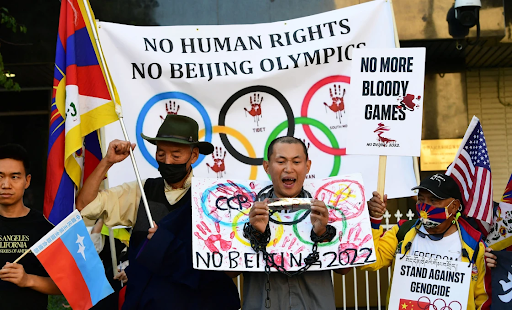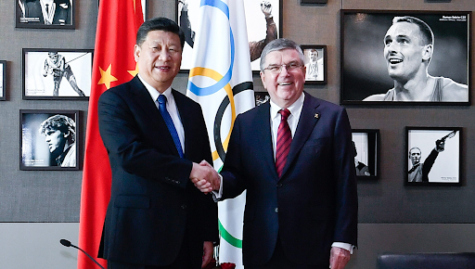Why Beijing is in the Hot Seat During the Winter Olympics

Human-rights protesters gather at the Los Angeles Chinese Consulate to demand the boycott of the 2022 Winter Olympics in Beijing.
January 18, 2022
February 2022 marks the time for the Winter Olympics, which will be held in Beijing, China according to the official website. Since its birth, the Olympics have been a symbol of international unity and peace, even throughout major global discourse such as the 1936 Summer Olympics in Berlin, Germany, and the 1980 Summer Olympics in Moscow, Russia. However, the controversy behind the 2022 Winter Olympics may be a close runner-up.
What Is The Controversy Behind the 2022 Beijing Olympics?
There are various reasons why there are calls for boycotts of Beijing. The main three are:
- China’s inhuman practice of holding minorities in concentration camps
- A recent rise in Covid cases (especially the increase in cases as a result of the Omicron variant)
- China’s mistreatment of and increasing influence in Hong Kong, Taiwan, and their homeland.
Concentration Camps: China is no stranger to state-sponsored murder. As the Washington Post says, under Chairman Mao Zedong (who founded the Communist People’s Republic of China), over 80 million Chinese people were killed as a result of his deadly policies and direct orders. Mao’s regime caused more deaths than Hitler (30 million) and Stalin (40 million) combined. Considering the dark history of the Chinese Communist party, it is no wonder that religious and ethnic minorities like the Uyghur Muslims are going through similar treatment that Chinese citizens were subjected to in the last century. Satellite images from Xinjiang show “reeducation sites” that resemble prisons with “high walls spiked with barbed wire.” In these highly secretive facilities, people (especially Muslims) who disappear are subject to extreme “indoctrination classes” and genocide.

Given the state-sponsored horror, some countries are not going to send their diplomats to Beijing in a show of retaliation and acknowledgment of their crimes. Although this is not a choice that comes without negative consequences, people like Anonymous Chinese YLHS Student (10) believe, “ I don’t think the boycott is bad and I understand why countries are agreeing to do it, but honestly I don’t think this is the best way to protest the Chinese government and it’s not going to change their ways.” As seen previously at the 1980 Summer Olympics in Moscow, collective boycotts are a powerful statement, and not much more.
Covid: The first Covid case in China more than three years ago, was just another added strain on China’s relations with the world. Anonymous Student #1 (10) offers their opinion on the Covid-related boycotts “Obviously, Covid is a challenge so it is very dangerous for the world’s athletes to compete in one city. Overall [the Chinese Winter Olympics] should be canceled like Japan” (The 2020 Summer Olympics in Japan were postponed, and ultimately not canceled).
Chloe Yu (10) is reportedly “looking forward to [the Olympics] because it is the first time that China is hosting the [Winter] Olympics” Yu does add that she is “also afraid that it will get canceled because of Covid.” China has implemented many restrictions to prevent the spread of Covid, which “just comes with a high price to people’s everyday life and to the economy” according to University of Hong Kong Virologist Jin Dongyan.
Authoritarianism: Anonymous Recent American Immigrant from Hong Kong (10) left Hong Kong as a result of the Chinese offensive. She states that “[the Chinese] started to remove a lot of sculptures and artworks in universities that relate to human rights.” Most iconic symbols of protesters calling for freedom like the Tank Man have been censored in China (However, the censorship reached a new domain: Bing). She says that “many [news sources and companies] were unable to withstand the pressure [from the Chinese and Hong Kong] governments and closed.” Amongst oppressive censorship is China’s ruthless spying on other nations, especially Taiwan. Taiwan is also being eyed for invasion by China, further threatening the current tense peace. Chinese surveillance is expected by many countries, leading several Olympic Associations to “encourage “ their athletes to bring “rental/disposable computers and ‘burner phones.”

The Situation
Diplomatic Boycotts by Nation
- 12/3/21 Lithuania cites a “diplomatic spat” (as of 12/8: Lithuania is the first and only EU member to announce a diplomatic boycott).
- 12/6/21 United States of America cites “given the PRC’s ongoing genocide and crimes against humanity in Xinjiang and other human rights abuses” but as Press Secretary Jen Psaki says, “The athletes on Team USA have our full support. We will be behind them 100 percent as we cheer them on from home. We will not be contributing to the fanfare of the games.”
- 12/7/21 New Zealand cites a “range of factors but mostly to do with Covid.”
- 12/7/21 Scotland cites “reports of serious, widespread and systemic human rights abuses committed against members of the Uyghur and other minority ethnic communities in Xinjiang, as well as by China’s overall record of human rights violations, including in Tibet and in Hong Kong.”
- 12/8/21 Australia states that a diplomatic boycott is the “right thing to do” and in Australia’s “national interest.”
- 12/8/21 Canada cites “human rights violations.”
- 12/8/21 United Kingdom’s Prime Minister Boris Johnson says, “We do not support sporting boycotts,” but there are “no plans for ministers to attend.”
- 12/10/21 Latvia cites “various circumstances” but “Latvian Ambassador to China Maija Manika will attend the games.”
- 12/12/21 Estonia cites “political factors.”
- 12/14/21 Austria’s Chancellor Karl Nehammer explains, “This is not a diplomatic…boycott, but only due to the fact that the COVID-19 requirements are high in China…We have a very clear stance when it comes to the human rights situation in China. However, I don’t think it is reasonable to artificially let the Olympic Games become a political event.”
- 12/14/21 Belgium cites “references to concerns over China’s human rights record.”
- 12/24/21 Japan’s Prime Minister Fumio Kishida says that his government “does not intend to use a specific phrase” but “Japan believes that it is important that the universal values of freedom, respect for basic human rights, and the rule of law be guaranteed in China…”
Sources: (www.newsweek.com/cnbc.com)
Normal Attendance By Nation
- France reportedly “opposes using sports competitions to highlight concerns over human rights” (www.thehill.com).
- 12/7/21 Italy “is not planning to join…in a diplomatic boycott” (www.reuters.com/www.thehill.com).
- Norway’s Henrik Thune from the Norwegian Ministry of Foreign Affairs says, “The Norwegian government does not generally consider boycotts to be an effective means of promoting peaceful development, human rights and mutual understanding between countries” (www.thehill.com).
- 12/9/21 Russia’s Olympic Committee President says that “[boycotts] are absolutely pointless” and of “a political nature” (www.reuters.com).
- South Korea cites “its coordination with China over North Korea” (www.thehill.com)
China’s Reactions
- 12/7/21 Chinese Foreign Ministry Spokesperson Zhao Lijian said China would implement “resolute countermeasures” against the United States (www.cbssports.com).
- 12/8/21 China reportedly “never planned to invite US and Western politicians who hype the ‘boycott’ topic” (www.bbc.com).
- 12/14/21 Chinese Foreign Ministry Spokesperson Wang Wenbin said “Sports has nothing to do with politics…It is they who have written, directed and performed this farce” (www.news.wttw.com).
- 1/7/22 Wang Wenbin stated “No one would care whether they [the Australians] come or not” (www.news.northeastern.edu).

International Olympic Committee Statement
“The presence of government officials and diplomats is a purely political decision for each government, which the IOC in its political neutrality fully respects. At the same time, this announcement also makes it clear that the Olympic Games and the participation of the athletes are beyond politics and we welcome this” (www.usatoday.com).




































